What is Working and What Needs to Change in Youth Soccer Today
Brandon Jantz has loved the game of soccer since he could walk. Jantz has played soccer all his life and when he was young, at Temecula Valley High School and California State University, Fullerton. Jantz owns the Temecula FC team which plays in the NPSL and recently hired Austin Levins as Head Coach and to oversee player development at the youth academy.
Passionate about giving back to the Temecula community and helping grow the game, both Jantz and Levins speak out on what is right and wrong in soccer today.
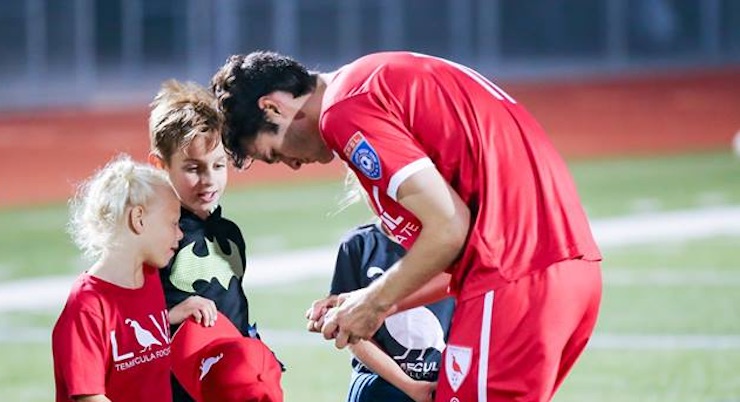
We have been asking the tough questions: What do you believe is Right and what is Wrong in American soccer? And, what needs to change in youth soccer today? And this popular editorial series is back with new interviews!
Related Soccer News: NPSL SPOTLIGHT: TEMECULA FC’S BRANDON JANTZ
SoccerToday’s Diane Scavuzzo interviewed Brandon Jantz, owner of Temecula FC and Austin Levins who has recently relocated to the USA from Ireland and is the new Head Manager on the future of soccer in America, specifically on what we need to do differently if we want to accomplish our goals of growing the game and competing on the world stage.
California’s National Premier Soccer League (NPSL) team Temecula Football Club was started in 2013 and kicked off in 2014 season in the Southern Conference of the NPSL’s Western Region. The red and white team is known for its passion for the beautiful game and its leadership in the community.
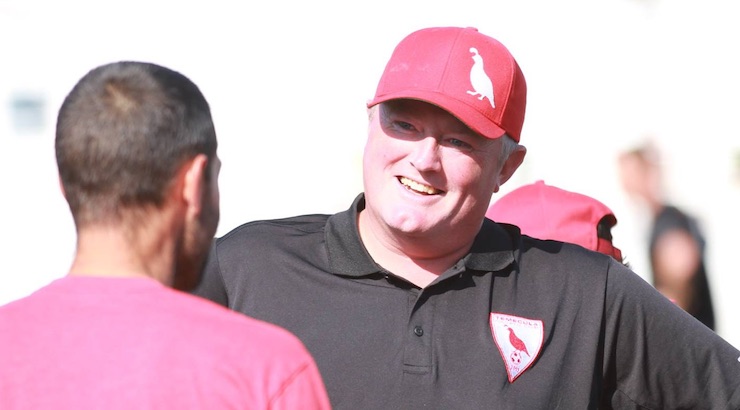
Diane Scavuzzo: What do you believe is Right and what is Wrong in American soccer? And, what needs to change in youth soccer today?
Brandon Jantz: Well for starters, the costs involved with playing the game at youth level are crazy.
Austin Levins: I come from a country where playing/coaching the game is a privilege, not an automatic right because you can afford the fees.
I have been mind-blown at the costs involved with kids playing at youth-levels.
Diane Scavuzzo: What needs to change in youth soccer today?
Austin Levins: The culture needs to be looked at with soccer parents’ behavior being a major issue.
The culture of “street-kids” or lack of it, is something that has surprised me.
There are similar issues back in Ireland also, we have a generation now of kids who are more tech-literate than sports literate.
In my days, we played in fields with jumpers for goalposts.
We need to get back to that ideal that fuels kids’ imaginations with physical activity. Right now, we need to have our kids playing games on the street, nurturing their abilities both physically and mentally.
Parents should encourage their kids to watch more games on TV and in the flesh, to go and support their local NPSL team, have the experience to be a supporter.
Brandon Jantz: I agree. Too many youth soccer players only have contact with a ball when they come to practices or on game-days because they have too many outside distractions.
Austin Levins: Parents need to step away from the mentality of easy appeasement, if little Johnny wants something, he has to earn it first, and not because the parents will buy it for the child just to get a break!
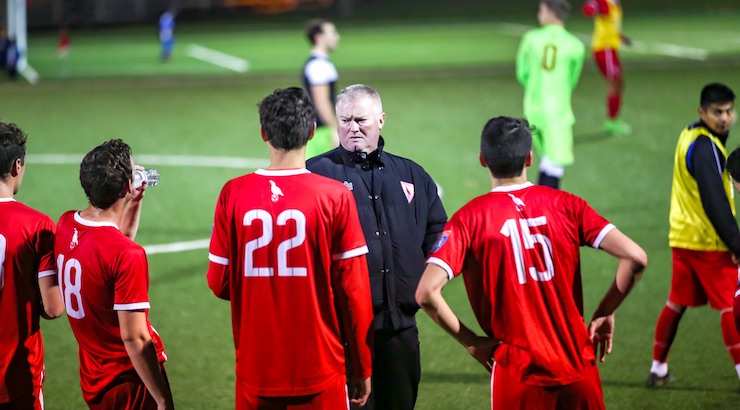
Diane Scavuzzo: Today’s modern game of soccer — Where have we fallen short and how can that be improved?
Austin Levins: I think the dynamics have been changed greatly over the last 20 years. There is much more commercialism in the game now than there ever was.
I know of several international players who were heroes to me growing up, who didn’t earn in their career what some average professionals earn in a week now.
The advent of the game being more widely broadcast has seen a lot more money come into the game. Sadly, this is what has damaged the youth game.
Diane Scavuzzo: What is it like in Ireland? Are youth soccer clubs recognized for developing talent?
Austin Levins: In Ireland, any player moving to a professional contract will be valued and the youth club responsible for his or her development will be financially compensated for the time they invested in the player.
A lot of clubs in Ireland have been able to grow from the finances raised by a youth player earning a professional contract in the UK.
The money goes back into developing facilities, continuous education of coaching staff and volunteers.
Diane Scavuzzo: What else is slowing the success of soccer in the USA?
Austin Levins: Another issue that is stunting the growth of the game in the US is the lack of promotion and relegation in the professional leagues.
This is where the USA really needs to look at how the systems around the world operate.
Diane Scavuzzo: Are we, in America, creating a real pathway for our youth players to become professional players?
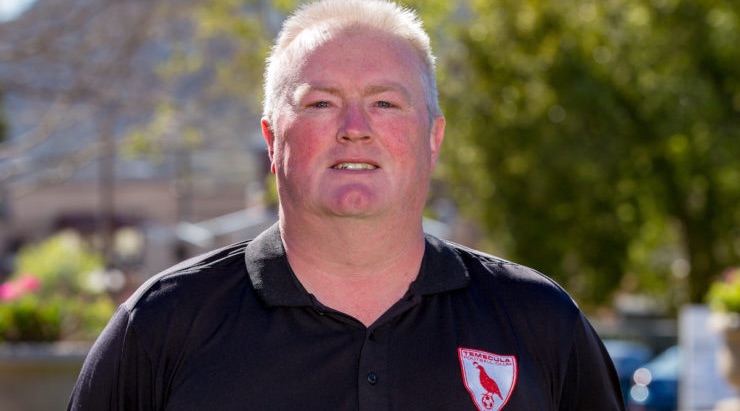
Austin Levins: I believe the player pathway needs a lot of attention.
#1. The fees that some clubs charge to have kids play at Youth Soccer Club level are staggering.
As a result, some of the real talent that is out there, the “street-footballers” are being priced out of the game and that is not just an issue for our sport.
There is way too much greed in the game money-wise, at the wrong levels.
It is too easy for a lowly licensed youth soccer coach to earn incredible sums of money.
#2. I also think the growth of some clubs is hindered by the lack of ability to have their own grounds and or facilities.
Having your own pitch and clubhouse is the first goal of a club back in Ireland. Clubs which cannot afford a private ground are assisted by the local authorities with pitch assignments for a season and the game is coached by volunteers, who do so for the love of the game.
#3. Youth clubs who do not have a pathway for players to play the game as an adult need to do find one. Tie-ins with the NPSL are important.
Player development isn’t a one- or two season thing, it’s a lifetime commitment.
Sadly, there are too many people who see the child as a “product” and justify their lack of action with an attitude that once they are no longer that child’s coach. Their interest in them is gone because they no longer get paid by that child’s parents.
It’s not about winning trophies in any one season.
It is preparing the players to be the best professionals they can be when they are old enough to step up into the professional ranks.
Diane Scavuzzo: Why did Temecula FC choose to compete in the NPLS?
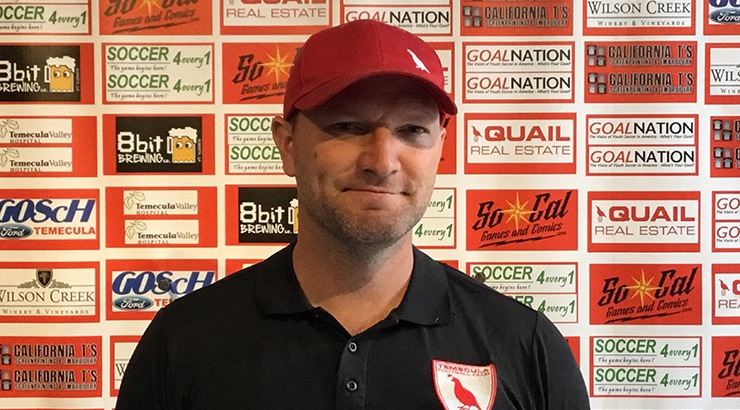
Brandon Jantz: We joined the NPSL to give the top players in Temecula a real club to play for. The NPSL is a real pipeline for our players — We’ve had three players already pass from Temecula FC into professional soccer in the United States.
Austin Levins: I am an ambitious coach and in Ireland, I reached the top of the game with Shamrock Rovers. In relocating to the US, I was curious how the diversity of my career, with the many roles and projects, would be welcome to an organization. Once we had decided on where we would live, I researched a few of the clubs in the area and this led to a meeting with Brandon.
Within 10 minutes of meeting Brandon, I knew I had met the perfect match for my experience — with similar beliefs and ambitions about how the game should be developed.
There is a lot of what is good in the game in the people at Temecula Football Club and I hope that my experiences and knowledge of the game will serve the club for many years to come.
I have a lot of faith in the direction the club wants to go, and the more I learn about the NPSL as an organization, the ambitions for the future are something I hope to play a part in.
Diane Scavuzzo: How is coaching a team in California different than in Ireland?
Austin Levins: The climate for starters! I’ve spent many a Saturday watching teams in my old club where changing clothes 2 or 3 times in just a few hours was needed because of the weather!
Also, I’ve personally had to adjust to the support on the sidelines of youth soccer games.
Youth Soccer Parents get away with a lot over here, which would simply not be tolerated in Ireland.
That’s been one of the biggest issues I have had to adjust to.
Diane Scavuzzo: When did you first start coaching?
Austin Levins: I first started coaching back in 1998. It started with me agreeing with a Dad to give a help to his son-in-law who was struggling with his team. They had 8 games to go and I was able to quickly identify some issues which turned the season around winning 7 of the 8, and drawing one!
I then went to my old schoolboy club, Templeogue United and brought a team from U17 to U18 and then into Leinster Senior League, winning our Division in our first Senior season and runners-up in a Cup.
After that, I moved to Shamrock Rovers — and this is Ireland’s most successful professional club. I initially coached their LSL Inter team and was promoted to Reserve Team Manager / Head Coach.
Nine of my players ended up in the first team for Rovers.
Several more went elsewhere professionally. Later, I joined Derry Rovers AFC in my hometown of Edenderry and spent over 9 years with them and managed/coached the Senior teams and developed a Youth section for the club. I also helped to establish Football For All, a program I really believe in.






